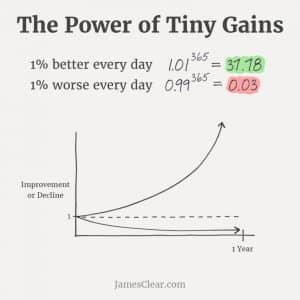Last May in La Jolla, CA, while attending the annual Financial Planning Association (FPA) Retreat, Gayle was inspired by a powerful presentation. The topic was a common theme, improvement and working towards success in any given area: fitness, relationships, or, yes, even financial planning. The gentle invitation of 1% better felt new and welcoming, in a goals-driven culture. We hope you see why.
At the bottom of our newsletter, we introduce a new feature: What Matters Most. This month we offer suggestions for 1% improvements in the parts of your lives associated with money. We invite your feedback and sharing.
James Clear, author of Atomic Habits, spoke about what happens when we make tiny, tiny improvements, every day. We’re talking 1% gains. 1% gains may seem tiny, but aggregated over time, they produce significant results. The way the math works out, a 1% improvement, every day for one year, equates to the exponential gain of being 37 times better at the end of the year! Mirroring how your investment funds multiply through compound interest, the effects of your habits multiply as you repeat them, day after day. And by the way, compounding is true for positive as well as negative habits.

The powerful example that caught the author’s attention was the British Cycling team. In 2003 the organization hired a performance director who suggested tiny improvements in a wide spectrum of team areas. He implemented everything from heated bikeshorts for maintaining ideal muscle temperature, to perfect sleeping pillows for restful sleep, to painting the inside of the bike truck white to see otherwise imperceptible dust affecting the performance bicycles. Within 5 years, the British team reversed their pattern of mediocrity and claimed 60% of the gold medals in cycling at the 2008 Beijing Olympics. The aggregation of 1% improvements unlocked these elite results.
The author made connections to how tiny improvements can impact our daily lives and longer term goals. First of all, the term “goal” is misleading—it is the systems we construct that are strong and have meaning. We can use goals for determining a direction, but to make progress, we need to pay attention to our systems. Systems broken down into small actions more fundamentally, consist of habits.
What is a habit? A habit is a mental shortcut we create, in order to solve a problem with less energy.
For example, my problem is I want to floss my teeth daily. Mental shortcut: keep the floss in a bowl next to the toothbrush. To implement new habits, start small, such as making the bed, or getting up on time; these rudimentary habits build a sense of control, create nudges for ourselves, and push us in the right direction.
The author outlined 4 stages of habit formation—which means there are 4 places to intervene:
1. Cue – trigger that tells the brain to initiate a habit.
- Make it obvious.
2. Craving – the meaning assigned to the cue.
- Make it attractive.
3. Response – actual habit performed.
- Make it easy.
4. Reward – result that satisfies your craving.
- Make it satisfying.
Our habits are the entry point to our systems, which are the pathways to our goals. Keeping our habits small is the meaning of 1%. The tiny habits we choose to learn, or “atomic habits”, are the strategic decisions we make to establish systems in our lives. Systems not only give structure to attaining our goals, but they also generate a sense of satisfaction and strength. In other words, the end result is not all that matters—our happiness resides here, in the moment, and with each choice we make, each step we take.
For more from the author of Atomic Habits:
What Matters Most
1% Better Every Day: Financial Habits
Here we offer some ideas for applying “1% better” to our financial lives. Do any of these suggestions resonate with you?
Daily purchases:
- Reduce weekly lunch purchases from five days to two.
- Eliminate coffee purchases during the week and make it at home.
- Review your variable expenses on the Integral Wealth Portal; pick one category to reduce by 1% each month.
- Reduce credit card expenditures by 1% each month.
- If shopping is a negative habit increasing credit card debt, pause and take a breath. Before making any purchase, traveling to a store, pulling out your wallet, take a deep breath 3 times. Ask, do I really need this item?
- Take a breath of appreciation each time you pay bills or make a payment. Be appreciative of the service or product that you are paying for.
- Once a week or once a month, review your investments accounts with curiosity and interest. Eliminate fear of market volatility and gain knowledge.
- Read every CK News and respond with questions and comments.
- Do you punish yourself if you are not perfect?
- Are you excited when you come under budget?
- Do you feel overwhelmed and fearful when viewing negative market news?
